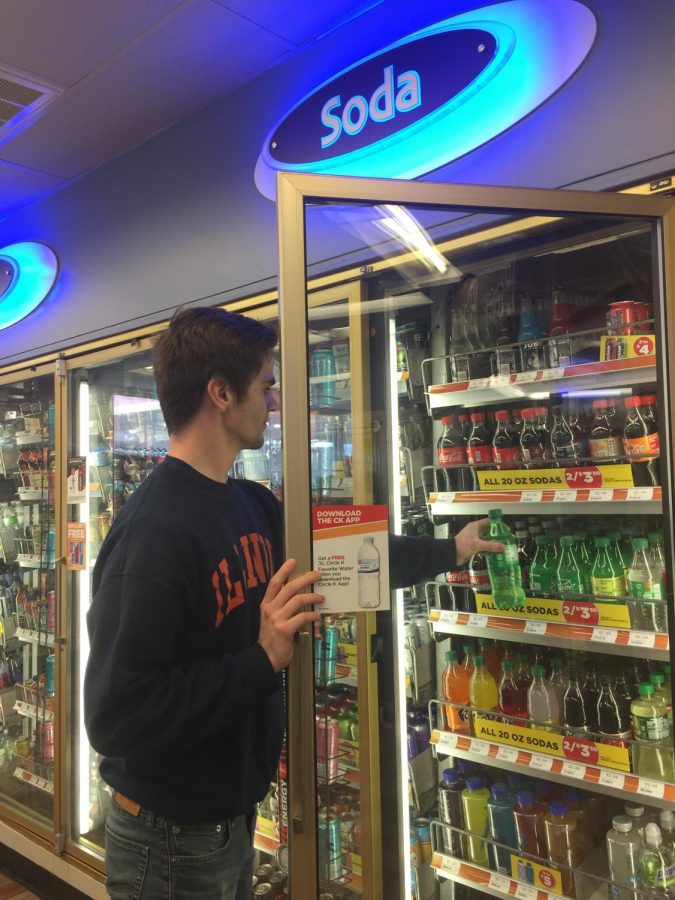Opinion | Treat soda like cigarettes
A student grabs a Sprite at the 57 North convenience store located in the SDRP.
May 3, 2020
Fifty years ago this April, the Federal government banned tobacco companies from advertising on television and radio. It was part of a national campaign to end smoking; this campaign was fueled by a flood of scientific evidence showing the link between smoking and cancer, nicotine’s addictive properties and the public health crisis posed to non-smokers from exposure to secondhand smoke.
Now, the time has come for policymakers to treat the health crisis brought on by sugar like the health crisis brought on by smoking. As COVID-19 wreaks havoc across our country, let’s not forget that a healthy lifestyle is the best protection against any disease. Because obesity is a risk factor for COVID-19, there’s never been a more urgent time to choose healthier drink options.
Added sugars are terrible for your health; soda is the worst form of added sugar. Containing no fiber or supporting nutrients, soda spikes your blood sugar and overloads your liver. According to the Harvard School of Public Health, soda consumption is a major contributor to the obesity epidemic and all of the diseases that accompany it, including Type 2 diabetes (unheard of in children until recently) and premature death.
A pack of 20 cigarettes in Illinois comes with a hefty $2.98 “sin tax.” In addition to collecting revenue for the state, the tax disincentivizes people from buying cigarettes. Why not do the same with similarly harmful sugary drinks?
We did, actually, in Cook County, Illinois. The repeal of the penny per ounce soda tax, only one year in, demonstrates three things: how addicted we are to sugar as a society, how crucial it is we break that addiction and how much influence the soda industry has on public policy through its lobbying groups like the American Beverage Association.
Get The Daily Illini in your inbox!
As economists Richard Thaler and Cass Sunstein explain in their book “Nudge,” hyper-taxing undesirable products allows the government to practice “libertarian paternalism,” the concept that people should be free to make their own choices, but policymakers can nudge people in certain directions to make better choices.
A well-formulated tax does not ban soda and similar sugary products. You still have the freedom to consume them if you choose. You just pay a higher penalty for engaging in behaviors that harm public health. It still preserves your right to make market choices.
A soda tax can also be thought of as a down payment on future healthcare costs. Other industrialized nations have different health insurance policies (mostly public option in Europe), but that’s only part of the reason they spend considerably less on health care than Americans. Our standings as the 12th most obese country and 35th healthiest country help explain why we admire the European healthcare systems, but their prospects for success are bleak if we try to imitate them in America. If we were a healthier population, the Federal government would spend less on Medicare and individuals would spend less on medical bills.
It can be argued that the government has no right to tell you what to drink. However, the costs of disease brought on by excess sugar consumption are passed onto the public via health care costs and, in some extreme cases, disability annuities. Therefore, the government has a right to charge those with unhealthy habits for the future expenses that they will incur.
There’s one more incentive: the one applied to the beverage companies. If they want to avoid the soda tax, all they need to do is lower the amount of sugar they add to their products. Assuming that the tax kicks in at some sugar-per-serving threshold, every beverage company is equally incentivized to slash the added sugars.
The government has a duty to provide citizens with good science, not to make choices for them. Taxing certain goods over others isn’t making choices for them — it’s nudging them in one direction that promotes public health. After all, you are still free to fork over the extra pennies if you really desire the bubbly goodness of liver disease.
Incentives matter. People are always going to engage in activities that they find enjoyable, even if they’re detrimental to their health. Therefore, public officials need to use their enforcement powers to encourage salubrious behaviors, not ban unhealthy habits. With a good amount of nudging, we’ll look back and appreciate our better health and forget about the pocket change we lost in the process.
Mark is a junior in ACES.






